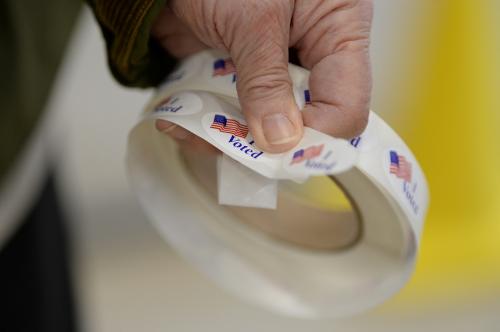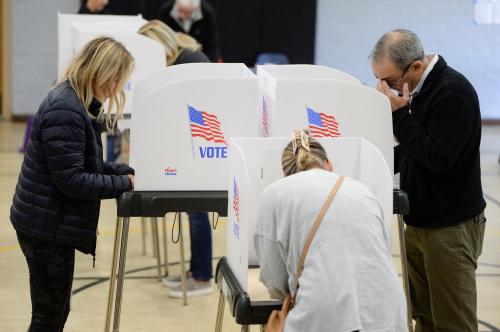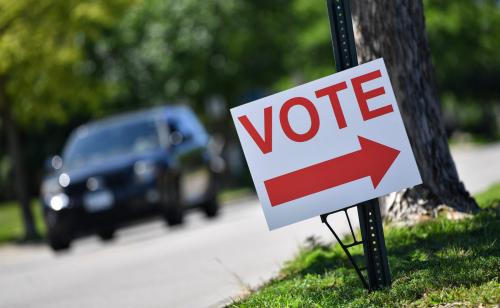American politics at the end of 2022 is deeply divided, and on many issues the state of discourse can only be described as tribalized. As the 2022 midterms demonstrated, Americans are split down the middle. The ‘red wave’, which was meant to provide Republicans with a sizeable House majority and potentially Senate control did not materialize. The American people did not deliver a clear mandate for the direction this country should take, and so we can expect two more years of bitter division as both sides make their case for why their differing visions of the country should be the one to break the deadlock.
One area, however, seems to be far less contentious than the domestic strife we hear so much about, U.S foreign policy. While there are of course arguments to be had, the level of vitriol is miniscule by comparison, and polling indicates bipartisan unity on many of the foreign policy issues in the news today. Below we will look at three countries currently making headlines, and how U.S. public opinion of the events involving them appears to be shaping up.
Iran
One of President Obama’s signature foreign policy initiatives was the Joint Comprehensive Plan of Action (JCPOA), commonly known as the Iran nuclear deal. At the time the deal was strongly opposed by many Republicans. Not surprisingly, President Trump withdrew from the deal in mid-2018. When President Biden was elected two years later, there was some optimism among the deal’s supporters that it may be revitalized. However, two major events have changed the prospects for a new deal; the war in Ukraine (specifically due to Iran providing drones to Russia), and the widely covered protests following the death of Mahsa Amini which have rocked Iran’s urban centers since October. These two events make the revitalization of a deal in the foreseeable future highly unlikely.
Over the summer, a bipartisan group of senators voted on a non-binding Republican-led measure essentially stating any new nuclear agreement would need to be “stronger” than the old one. Sixty-two senators total, including 16 Democrats, voted to approve the motion, indicating cross-aisle skepticism of reentering the deal. A sticking point of the deal was always the lifting of economic sanctions, and according to the Chicago Council surveys from earlier this summer, a substantial number of Americans continue to favor tighter economic sanctions on Iran. Nearly 80% (87% of Republicans, 80% of Democrats, and 73% of Independents) of Americans believe economic sanctions should be used against Iran if they were to restart development towards a nuclear weapon.
As for the protests, nearly three-quarters of Americans (73%) strongly or somewhat approve of the recent protests in Iran, while only seven percent disapprove. The Senate has likewise expressed their support, introducing a widely bipartisan resolution “reaffirming the United States’ support for the Iranian citizens who have taken to the streets in peaceful protest for their fundamental human rights, and condemning the Iranian security forces for their violent response.” An identical resolution was introduced in the House of Representatives by Congressman Tom Malinowski (D-N.J.) and Congresswoman Claudia Tenney (R-N.Y.). The protests in Iran have convinced many in the U.S., including former Secretary of State Hillary Clinton, that all negotiations in the way of a new nuclear deal should be put on hold for the time being.
Right now, the U.S. is taking a clear stance on Iran; negotiations regarding the nuclear deal should be temporarily shelved and focus should shift towards supporting the protestors on the ground demonstrating against a regime they believe is guilty of committing human rights abuses.
Ukraine
While some have noted that support for U.S. aid to Ukraine has been waning, it is clear that a substantial majority of Americans from both sides of the political spectrum do and will continue to believe the U.S. has a role to play in helping Ukraine in this conflict. When asked about aid for Ukraine, Sen. Jim Risch, the top Republican on the Senate Foreign Relations Committee said, “This is probably one of the most bipartisan issues that I’ve seen since I’ve been in Congress. We are bound to do this on a bipartisan basis. We’re arm in arm on this.”
Polling from the Quincy Institute for Responsible Statecraft and Data for Progress show that just 30% of those polled felt the U.S. should “stay as uninvolved as possible”. According to AP VoteCast, a nationwide survey of more than 94,000 voters, about 4 in 10 voters said military and financial support to Ukraine has been about right and 3 in 10 said the U.S. should be more active. Only about 3 in 10 wanted the U.S. to provide less to Ukraine. A Reuters/Ipsos poll from October found that 73% of Americans, 81% of Democrats and 66% of Republicans, felt that the U.S should continue to support Ukraine despite threats from Russia. According to the Chicago Council of Foreign affairs, as of early December, Americans continue to support supplying Ukraine with arms (65%), sending economic aid (66%), and sanctioning Russia (75%). This included a majority (55%) of Republicans who still favor sending additional arms and military supplies to the Ukrainian government.
In Congress, leaders from both sides of the aisle continue to voice support for Ukraine. Senator Rick Scott, in an interview with Meet the Press said, “I think we have to continue to do everything we can to support Ukraine, who wants to defend their freedom and stop Russia from continuing to expand”. House Minority Leader Kevin McCarthy’s pre-election statement of not wanting to write “blank checks” to Ukraine set off some alarm bells initially and raised the question of support for Ukraine should Republicans take the House. Though McCarthy quickly walked back the comment, the swift negative response to his statement, including from a number of notable Republicans, indicated unity on the issue. Senate Minority Leader Mitch McConnell has remained a staunch supporter of U.S. aid to Ukraine and has repeatedly gone after “isolationist” members of his party. He has remained resolute that the GOP would continue to support the “timely delivery of needed weapons” to Ukraine.
Concerns about aid to Ukraine have come largely from fears of a recession early next year and the economic threat of China, an issue many Republicans care more about than Russia. But a slim Republican majority in the House is not likely to be enough to significantly impact Ukraine’s funding. House Republicans could end up simply asking for more oversight of how U.S. funds and supplies are used, rather than cutting aid to the point that it has a battlefield impact. This could be a way of demonstrating fiscal responsibility to constituents concerned about the economy, without hurting Ukraine’s chances of regaining territory.
China
Gallup polling indicates that as of 2022, nearly 80% of Americans have an unfavorable view of China, a drastic increase from 2018 when it was 45%. According to Pew, 83% of Republicans hold a negative view of China, as well as 68% of Democrats. Though there is a 15-point gap, both figures demonstrate meaningful majorities which will guide policy going forward. Based on the Pew findings, Republicans and Democrats are very critical of China’s handling of the coronavirus, as well as China’s human rights violations, especially against the Uyghurs in Xinjiang.
While the most vocal criticism of China has usually come from the right, Democrats have also become more critical, recently opting to no longer support reducing tariffs on China to combat elevated prices, a decision with brings them in line with many Republicans. American legislators have introduced more than 400 bills or resolutions related to China since early 2021, according to data from the U.S.-China Business Council. This number includes a bill introduced by Senate Democrats and eventually passed which is intended to increase chip production in the U.S. and to boost competition with China.
Americans are also increasingly aware of the growing tension between China and Taiwan. According to Pew, a large majority of Americans (78%) say tensions between China and Taiwan are at least a somewhat serious problem for the United States. A survey conducted over the summer found that in the event of a Chinese invasion of Taiwan, 76% of Americans would support imposing diplomatic and economic sanctions, 65% would be in favor of sending additional arms and military supplies to the Taiwanese government, and 62% would be in favor of using the US Navy to prevent Beijing from imposing a blockade against Taiwan.
While the rationale for condemnation might not always be in perfect lockstep, both Democrats and Republicans are clearly moving in the same direction on how to handle China.
Conclusion
Thus, surprising as it is in these polarized times, Americans do agree on some things. As Our Primaries Project findings demonstrated, belief in America’s active role in the world was something that members of Congress from both sides of the aisle were able to agree on. This sentiment is clear in the polling mentioned above as American’s want to continue to see support for the protests in Iran, support for Ukraine in their war against Russia, and a more hardline stance against China, due to their economic competition, human rights record, and their threat to Taiwan.
The Brookings Institution is committed to quality, independence, and impact.
We are supported by a diverse array of funders. In line with our values and policies, each Brookings publication represents the sole views of its author(s).









Commentary
Americans can still agree on some things
December 16, 2022